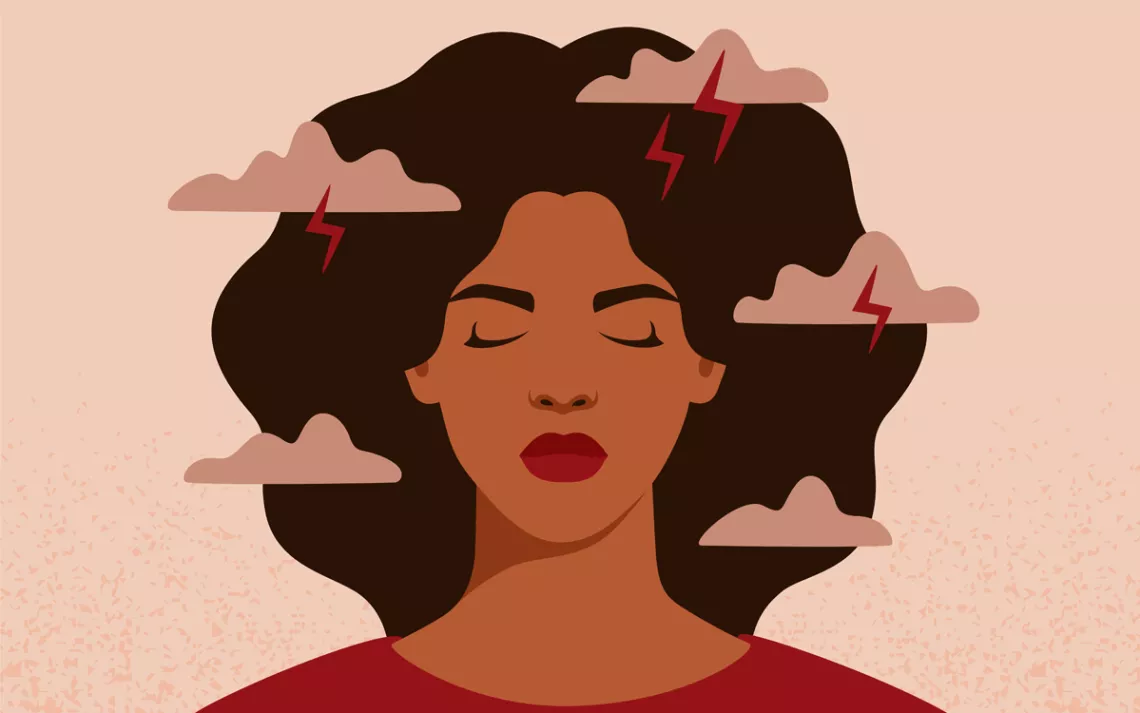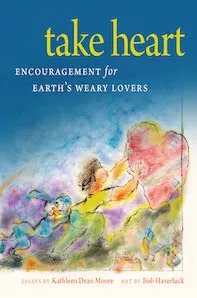A Short Treatise in Defense of Outrage
An excerpt from the new book "Take Heart: Encouragement for Earth’s Weary Lovers"

Illustration by iStock/Ponomariova_Maria
From Take Heart: Encouragement for Earth’s Weary Lovers ©2022 by Kathleen Dean Moore. Reprinted by permission of Oregon State University Press.

A decade or so ago, I did a bad thing. It’s not the only bad thing I did in the ensuing decade, but it certainly stands out in my mind. Leafing through a magazine, I had come across a fossil-fuel company advertisement. Here was a photo of the cloud-splashed Earth above the caption, “MOTHER EARTH IS A TOUGH OLD GAL.” I was outraged. The sexism, the disrespect, the arrogance, the danger of the implied conclusion—Go ahead and drill her—made me livid. So I wrote an open letter to the CEO of that company, in which I opined: “If the Earth were your mother, she would grab you in one rocky hand and hold you underwater until you no longer bubbled.”
That was not nice. And boy, did I hear about it. So, I want to say I’m sorry to have done a mean thing, but at the same time, I would like to offer a short treatise in defense of the outrage that prompted it.
*
issue: Is expressing moral outrage at the destructive decisions of extraction-industry executives and their government lackeys—and the consequent global warming—a moral failing in itself?
definition: Moral outrage is an extremely strong reaction of anger, shock, or indignation at a perceived moral wrong.
thesis: Expressing outrage at the world-wrecking decisions of extractive industries is a moral obligation.
case: I believe in the free expression of moral outrage. Moral outrage is a public statement that an act is wrong—a wrong to me and to others, a taking, a suffering inflicted, a base and shameful act. Expressing outrage is a form of witness, a public testimony, an affirmation of public standards of what is morally permissible—and what is not. Thus, moral outrage plays an essential part in a just and decent society: The failure to call wrong-doers to account leaves the victims of wrong-doing undefended. The failure also leaves standards of right and wrong undefined.
objection #1: There’s no good purpose served by pointing a finger of blame at people. It alienates them and so is counterproductive. That’s not how deals get done.
response to objection #1: Sorry, but I get this argument all the time, and I’m sick of it. The work of saving the planet from wreck and plunder is not the Art of the Deal. This is not Getting to Yes. This is Getting to No.
objection #2: Moral outrage has the effect of demonizing people, and it does no good.
response to objection #2: It does no good to demonize?!?! Of course, it does a world of good to demonize—to name wrong when you see it. Silence in the face of evil is a species of violence. Can we claim to have moral standards at all, if we shudder to make any moral judgments based on them? Can we claim to love justice, if we are silent in the face of injustice? “See something, say something” used to be about bombs on trains or some such thing. Now it is the slogan of the aroused conscience.
objection #3: We should show compassion to the leaders of extractive industries. Compassion requires us to see the wrong-doer as a full person, with his own hopes and fears. Corporate and government leaders are just exceptionally well-dressed white men trying to do their jobs in a system they did not create. Every quarter, shareholders critique their financial reports, so how can executives justify long-range decisions? In all states but one (Oregon), laws require them to make decisions based on the best financial interests of the shareholders, so how can they pass up any chance to maximize profits? The rules that might limit pollution are weak and badly enforced, so how can executives be expected to restrain themselves?
response to objection#3: I ask you, what is moral integrity inside a harmful system? It’s refusing to play by the rules that you recognize are soul-devouring. It’s refusing to play a rigged and dangerous game, even if it means giving up an annual salary of (for example) $40,300,000 as the CEO of ExxonMobil. Refusing to be complicit is a choice open even to people with gold cufflinks—a hard choice, maybe, but a choice. Moral outrage treats powerful decision-makers as responsible human beings, not as victims or helpless idiots or pawns.
objection #4: The Dalai Lama explains that “destruction of nature and natural resources results from ignorance, greed, and lack of respect for the Earth’s living things.” Not from some dark seed of evil deep in the soul.
response to objection#4: I would not contradict the Dalai Lama. But don’t I have an obligation to name the ignorance, the greed, and the lack of respect, which are, the last time I looked, vices? Should compassion for the person prevent me from naming the horror they are creating—not as an unintended byproduct of their decisions, but as the knowing, directly intended or homicidally reckless, and very carefully calculated consequence of their decisions?
objection #5: Compassion is one of the great virtues of humanity. Is there no place left for compassion in this weary world?
response to objection #5: Yes. There is an essential place for compassion, but everybody keeps putting it in the wrong place. The proper place of compassion is not in deciding what is right and wrong, better and worse, just and unjust. Compassion comes after that judgment, when we are clear in our minds that a person has done wrong. Then, at that point, we confront our duties of compassion, when we decide what to do about it. Mercy then could stay the sword of justice, if that would serve the public interest. What punishment Mother Earth herself has to inflict, I can only fear.
restatement of case: Outrage is a measure of what a person cares about the most—what she loves, what ideals she affirms, what breaks her heart or dashes her hopes. It is a response that bears witness to undeserved suffering. Outrage is a testimony to love. It is one step away from overpowering grief.
 The Magazine of The Sierra Club
The Magazine of The Sierra Club



